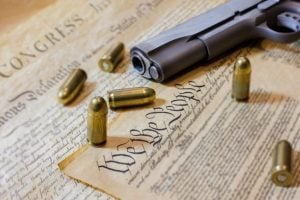
(image via Getty)
Last week, Remington Outdoor Co., maker of the AR-15 Bushmaster rifle used to gun down 20 children in Newtown, Connecticut, appealed a ruling against them by the Connecticut Supreme Court. Connecticut allowed the families of the Sandy Hook massacre to sue Remington over its marketing practices.
The appeal to the Supreme Court was long expected and, frankly, likely to succeed. The Supreme Court is likely to side with the gun manufacturer, in part because Republicans successfully stole a seat on the Supreme Court and installed an alleged attempted rapist in another seat. But the appeal is also likely to succeed because Congress wrote a law meant specifically to protect gun manufacturers and not the victims of their products.
The law is the Protection of Lawful Commerce in Arms Act, and signed into law in 2005 by President George W. Bush. The law provides sweeping immunity for gun manufacturers when their products are used in the commission of crime. The law has a few carve outs — you can still sue the manufacturers for “product defects” and the like. But when you use the gun AS INTENDED to mass murder children… well, then victims can’t sue the gun makers at all.
It’s important to note that other products are not afforded this kind of immunity. If you use a Chevy to mow me down in a crowd of protesters, I probably don’t have a cause of action against Chevy. But if Chevy advertises its new Silverado as “great for mowing down protesters and owning the libs,” well, I might have a cause of action against Chevy.
And don’t even get me started on tobacco. If Big Tobacco were gifted this kind of Congressional immunity, they’d still be selling cigarettes to teens as a good way for them to “put hair on their chest.”
The families are pursuing Remington under unfair trade practices laws, laws that are generally applicable to every product under the sun. But Remington’s appeal, wisely, claims that because they are selling guns, they cannot be sued. Remington squarely asks for the special protection Congress provided to them, and no other product:
Congress enacted the Protection of Lawful Commerce in Arms Act (“PLCAA”) to ensure that firearms—so central to American society that the Founders safeguarded their ownership and use in the Bill of Rights—would be regulated only through the democratic process rather than the vagaries of litigation. Congress passed the PLCAA in 2005 in response to a wave of lawsuits seeking to hold firearms manufacturers and sellers liable “for the harm caused by the misuse of firearms by third parties, including criminals.”…
This case is an archetypical example of the kind of lawsuit Congress sought to preempt, raising claims indistinguishable from those routinely asserted in the pre-PLCAA litigation that drove Congress to respond. The PLCAA’s operative text, Congress’s findings and purposes, and the PLCAA’s legislative history all point to one conclusion: General unfair trade practices laws like CUTPA are not encompassed by the predicate exception.
This argument is sick, and also almost certainly correct under the current law. I think it is likely that the Supreme Court will agree to review the case, and if they do, deliver a win for death. It could be a 5-4 decision, with all the pro-gun Republicans rallying together. It could be 6-3 with Justice Stephen Breyer writing a pained concurrence demanding that Congress do better. Hell, it could even be 8-1 (I think there’s a good chance Justice Sonia Sotomayor writes a “f**k this noise” dissent on general principles). Our conservative court is completely in the tank for the gun lobby, but this case won’t be their fault. Congress has expressly demanded that gun manufacturers be treated better than everybody else when their products kill.
Which brings us back to political action. You hear a lot of politicians talking about “universal background checks” and a lot of other small bore maneuvers after this (and every) mass shooting. You don’t hear many of them talk about repealing this law, and letting the threat of litigation and massive damages encourage gun manufacturers to do the bare minimum to ensure their products are not designed and marketed to kill as many people as quickly as possible. Again, you need only look at tobacco to know what massive product liability litigation can do to an industry that peddles death.
Where are the Democrats running for president on this issue? Well, in 2016, only one of the major Democratic candidates promised to explicitly repeal the PLCAA. And that was… Hillary Clinton. Bernie Sanders actually voted FOR the PLCAA in 2005, and defended his vote again in 2015.
I don’t even know where all of the 3,412 Democratic candidates stand on the law in this primary cycle. That’s because gun reform has not been at the forefront of the campaign (though I bet it will be now), and when it does come up, the media can only get their heads around background checks.
Most serious gun control regulation cannot happen so long as Republicans control the Supreme Court. But there are things that can be done while we wait. The repealing the Protection of Lawful Commerce in Arms Act would reduce gun manufacturers back to the condition of every other manufacturer. THIS is the “least we can do.” Background checks are just want we already should have done.
Maker of gun used in Sandy Hook massacre asks Supreme Court to block lawsuit [Reuters]
Elie Mystal is the Executive Editor of Above the Law and a contributor at The Nation. He can be reached @ElieNYC on Twitter, or at elie@abovethelaw.com. He will resist.

